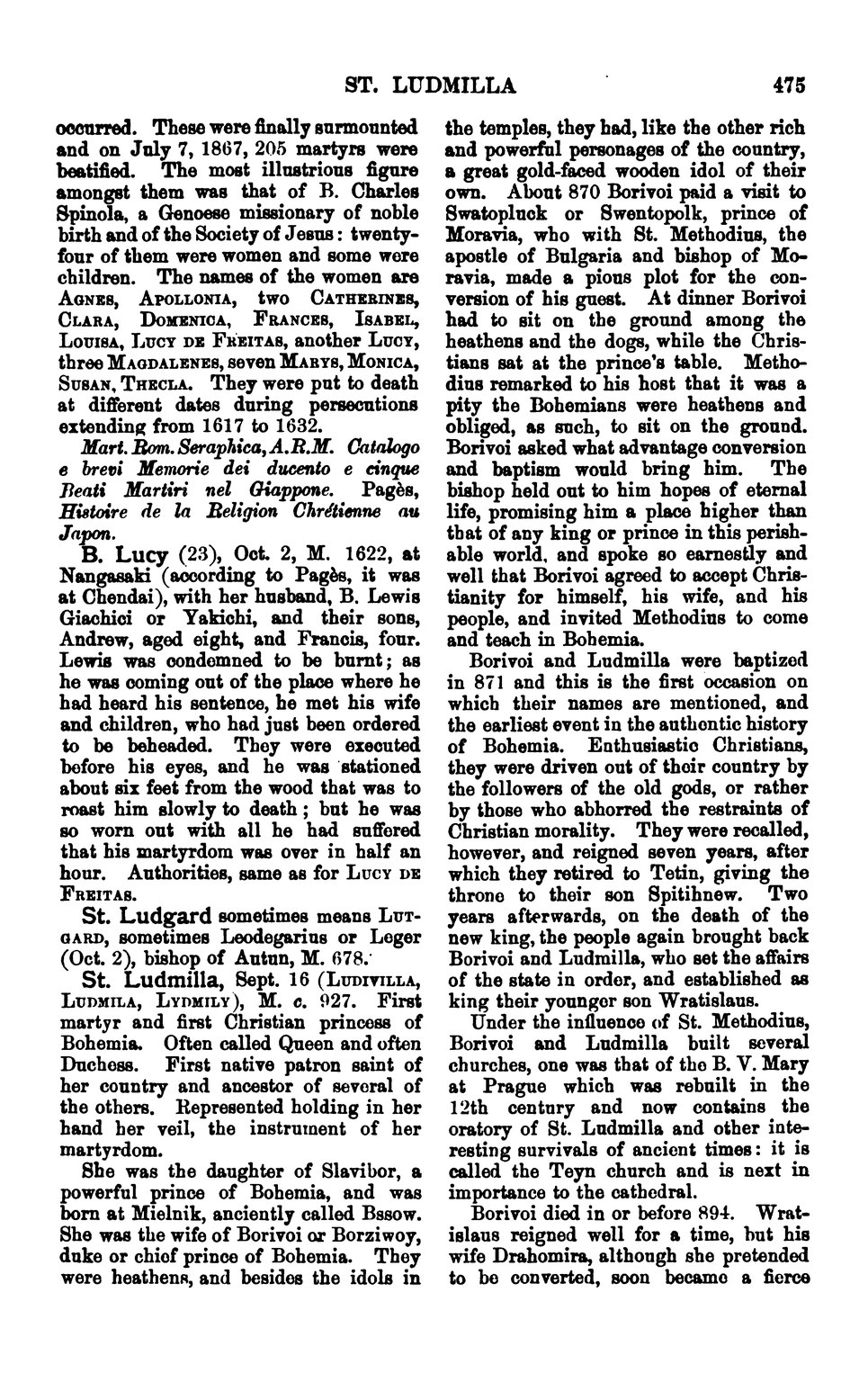occurred. These were finally surmounted and on July 7, 1867, 205 martyrs were beatified. The most illustrious figure amongst them was that of B. Charles Spinola, a Genoese missionary of noble birth and of the Society of Jesus: twenty-four of them were women and some were children. The names of the women are Agnes, Apollonia, two Catherines, Clara, Domenica, Frances, Isabel, Louisa, Lucy de Freitas, another Lucy, three Magdalenes, seven Marys, Monica, Susan, Thecla. They were put to death at different dates during persecutions extending from 1617 to 1632.
Mart. Rom. Seraphica, A.R.M. Catalogo e brevi Memorie dei ducento e cinque Beati Martiri nel Giappone. Pagès, Histoire de la Beligion Chrétienne au Japon.
B. Lucy (23), Oct 2, M. 1622, at Nangasaki (according to Pagès, it was at Chendai), with her husband, B. Lewis Giachici or Yakichi, and their sons, Andrew, aged eight, and Francis, four. Lewis was condemned to be burnt; as he was coming out of the place where he had heard his sentence, he met his wife and children, who had just been ordered to be beheaded. They were executed before his eyes, and he was stationed about six feet from the wood that was to roast him slowly to death; but he was so worn out with all he had suffered that his martyrdom was over in half an hour. Authorities, same as for Lucy de Freitas.
St. Ludgard sometimes means Lutgard, sometimes Leodegarius or Leger (Oct. 2), bishop of Autun, M. 678.
St. Ludmilla, Sept. 16 (Ludivilla, Ludmila, Lydmily), M. c. 927. First martyr and first Christian princess of Bohemia. Often called Queen and often Duchess. First native patron saint of her country and ancestor of several of the others. Represented holding in her hand her veil, the instrument of her martyrdom.
She was the daughter of Slavibor, a powerful prince of Bohemia, and was born at Mielnik, anciently called Bssow. She was the wife of Borivoi or Borziwoy, duke or chief prince of Bohemia. They were heathens, and besides the idols in the temples, they had, like the other rich and powerful personages of the country, a great gold-faced wooden idol of their own. About 870 Borivoi paid a visit to Swatopluck or Swentopolk, prince of Moravia, who with St. Methodius, the apostle of Bulgaria and bishop of Moravia, made a pious plot for the conversion of his guest. At dinner Borivoi had to sit on the ground among the heathens and the dogs, while the Christians sat at the prince's table. Methodius remarked to his host that it was a pity the Bohemians were heathens and obliged, as such, to sit on the ground. Borivoi asked what advantage conversion and baptism would bring him. The bishop held out to him hopes of eternal life, promising him a place higher than that of any king or prince in this perishable world, and spoke so earnestly and well that Borivoi agreed to accept Christianity for himself, his wife, and his people, and invited Methodius to come and teach in Bohemia.
Borivoi and Ludmilla were baptized in 871 and this is the first occasion on which their names are mentioned, and the earliest event in the authentic history of Bohemia. Enthusiastic Christians, they were driven out of their country by the followers of the old gods, or rather by those who abhorred the restraints of Christian morality. They were recalled, however, and reigned seven years, after which they retired to Tetin, giving the throne to their son Spitihnew. Two years afterwards, on the death of the new king, the people again brought back Borivoi and Ludmilla, who set the affairs of the state in order, and established as king their younger son Wratislaus.
Under the influence of St. Methodius, Borivoi and Ludmilla built several churches, one was that of the B. V. Mary at Prague which was rebuilt in the 12th century and now contains the oratory of St. Ludmilla and other interesting survivals of ancient times: it is called the Teyn church and is next in importance to the cathedral.
Borivoi died in or before 894. Wratislaus reigned well for a time, but his wife Drahomira, although she pretended to be converted, soon became a fierce
